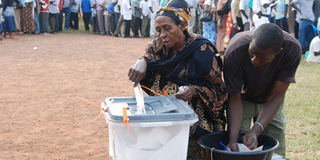Inflation projected to rise ahead of country’s 2016 elections

People vote in Kawempe during the 2011 elections. A Standard Chartered Bank report has projected an increase in inflation ahead of the 2016 elections. File Photo.
What you need to know:
The events in the economy will in turn make loans too expensive to potential borrowers.
Uganda’s inflation is expected to go up as the 2016 general elections draw close, a Standard Chartered Bank report has shown.
The ‘Global Focus 2014; Rising East, Emerging West’ report notes that while a stable Shilling resulting from increased inflows has surpassed inflationary pressure, vulnerability to adverse weather and expectations of increased government spending in the run-up to 2016 elections may increase inflation.
The sharp rise in the 2011 inflation to 30.4 per cent in October that year was, according to a section of business people, as result of irresponsible government spending during the 2011 general elections.
Increased spending
It is upon this basis that Standard Chartered Bank predicts that there may be increased spending in the forthcoming general elections which will increase money in circulation and thus inflationary pressure.
Although Ms Razia Khan, the bank’s regional head of research, Africa, predicts this year’s average annual inflation at 5.4 per cent, the report predicts an increase to 6.6 per cent in 2014 and 7.5 per cent in 2015.
Due to the upside risks to inflation, Standard Chartered predicts that Bank of Uganda (BoU) is likely to tighten the Central Bank Rate – the rate at which it lends to commercial banks – by 50 basis points in 2014, 150 basis points in 2015 and 100 basis points in 2016. This would mean that commercial banks will also increase the lending rates, which will further affect the performance of the economy by making loans too expensive to potential borrowers.
For instance, although BoU has been easing the CBR from 23 per cent in October 2011 when inflation peaked at 30.4 per cent to 11.5 per cent in December, commercial banks’ lending rates have been sticky downwards, averaging at about 21 per cent.
======================
Unstable inflation rate, account deficit
Uganda’s annual inflation currently stands at 6.8 per cent.
This is down from 8.1 per cent the previous month, although Standard Chartered Bank says the outlook remains uncertain in the medium term.
Inflation Rate in Uganda is reported by the Uganda Bureau of Statistics. From 1998 until 2013, Uganda inflation rate averaged 7.2 per cent reaching an all time high of 30.5 per cent in October of 2011 and a record low of -5.4 Percent in November of 2001.
Meanwhile, the report also projects that Uganda’s current account deficit is likely to remain in double digits as a percentage of the Gross Domestic Product (GDP) until oil production commences in 2017.
The deficit is expected to widen to 12.9 per cent of the GDP in 2013 and to 14.8 per cent in 2014, up from 10.9 per cent last year due to modest growth in exports against a high import bill.
The country’s trade imbalance is estimated at $2.5 billion, according to figures from the World Bank.




